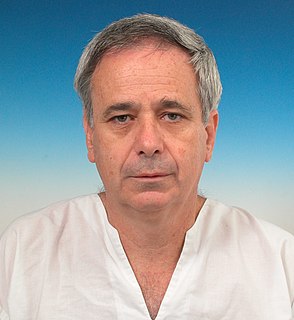A Quote by Adel al-Jubeir
I don't believe in the theory that the United States is reducing its presence in the Middle East. Quite the contrary, in the Gulf, we see an increase in American military presence, as well as an increase in American investments. The argument is more accurate when one says America is focusing more attention to the Far East. But I don't believe it comes at the expense of the Middle East.
Related Quotes
I believe that the Iraqis have an opportunity now, without Saddam Hussein there, to build the first multiconfessional Arab democracy in the Middle East. And that will make for a different kind of Middle East. And these things take time. History has a long arc, not a short one. And there are going to be ups and downs, and it is going to take patience by the United States and by Iraq's neighbors to help the Iraqis to do that. But if they succeed, it'll transform the Middle East, and that's worth doing.
Israel is the American watchdog in the Middle East, and that's why the Palestinians remain victims of one of the longest military occupations. They don't have oil. If they were the Saudis, they wouldn't be in the position they are now. But they have the power of being able to upset the imperial order in the Middle East.
From the standpoint of a Middle Eastern citizen, Americans look like a bully forcing our way of life on the Islamic way of life. The notion of purity is very important in Islam, and a lot of the negative warlike actions taken against us have to do with our physical presence in the Middle East. Osama bin Laden was trying to get the American, or protesting the American military presence in Saudi Arabia. It's not surprising that our strong presence in Iraq has produced a wave of resistance anger, extreme anger in some cases, and a permissive atmosphere that allows these people to go undetected.
Historically, the argument is we stole the country from the Indians. America stole the labor of African Americans for over 200 years under slavery. America took half of Mexico by force in the Mexican War. American foreign policy, the progressives say it's based on theft. Why? Because look, America is very active in the Middle East. Why? The Middle East has oil. Notice that America doesn't get involved in Haiti or Rwanda because they don't have any oil.
I think President Barack Obama came to office with quite fundamental understandings in his mind about what's possible and what's not possible in the Middle East. The first, I would say, revolutionary breakthrough that he introduced is that the Middle East doesn't matter to American geostrategy as much as we think.
Unless this [Barack Obama] American administration is willing to diverge from the conventional American policy in the Middle East by changing its basic attitudes on crucial questions, foremost of them Palestine, and support genuinely the rights of people for independence, sovereignty and identity across the board, the only "resolve" one would hope from the USA is to stay out of the Middle East for a while.
I think the public is very reluctant to get involved in more foreign wars, especially in the Middle East. And they understand, implicitly, that we go to war in the Middle East because of oil. And if we don't want to go to war in the Middle East, then we have to do something about the oil problem. And I think that view is gaining ground in the U.S.
This administration, Barack Obama and Hillary Clinton through their foreign policy, have betrayed the American people, because the weakness they've displayed has led to Putin's incursions in the Middle East and in eastern Europe, and has led - has led to significant problems in the Middle East as well, and the death and murder of lots of folks.
































